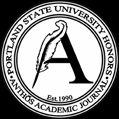Subjects
Discourse analysis -- Social aspects, Linguistics, Critical discourse analysis -- Methodology
Abstract
To see how positive identity assessments are created, I investigated two statements, both released by organizations that can broadly be described as part of Portland’s liberal or left community. Each statement responds to assertions that the actions of the organization, or one of its members, provides a platform for anti-Semitic, white supremacist, and/or fascist political organizers to make inroads in Portland. One set of data is a statement from Citybikes, a workerowned cooperative, that was published on Portland IndyMedia, a web-based independent media center; the other is a statement from a Portland community art space, The Variant, that was published on Facebook.
Through this Critical Discourse Analysis, I used linguistic feature analysis of adjectives, specifically attributive adjectives, to examine how identities are constructed. I found that both positive and negative identities can be crafted through the application of adjectives to subjects in the world. I also found that identity-crafting and conferring is a strategy that may be employed to refute a claim of problematic behavior without having to acknowledge, address, or engage with the behavior itself. In the texts examined in this analysis, the conferral of identity neatly sidesteps engagement with whether or not an organization or entity is undertaking or has undertaken distasteful or dangerous acts by pointing to positive personal attributes as evidence of 16 the inherent goodness or badness of the organization in question. The behaviors and actions themselves are therefore rendered meaningless and erased.
DOI
10.15760/anthos.2012.85
Creative Commons License

This work is licensed under a Creative Commons Attribution-NonCommercial-Share Alike 4.0 International License.
Persistent Identifier
http://archives.pdx.edu/ds/psu/12572
Recommended Citation
Rodgers, C.B.
(2012)
"It’s Not What You Do, It’s Who You Are: Adjectives as Identity-Conferrers,"
Anthós:
Vol. 4:
Iss.
1, Article 6.
https://doi.org/10.15760/anthos.2012.85
